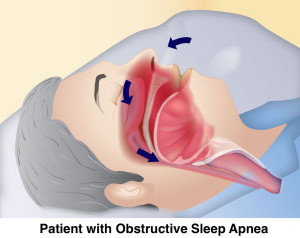Sleep Apnea
Most of us don’t think of snoring as something to be overly concerned about, but frequent, loud snoring may be a sign of sleep apnea. Millions of people suffer from sleep apnea, a constriction of the airway from collapsing throat tissues and/or the tongue blocking the airway during sleep. Even though sleep apnea is treatable, it often goes unrecognized. Untreated sleep apnea can be dangerous and detrimental to your health, making it vital to visit your dentist if you suspect that you or a loved one might have sleep apnea.
What is Obstructive Sleep Apnea?
Obstructive sleep apnea (OSA) is a sleep-related breathing disorder that prevents airflow during sleep. OSA occurs when the tissue in the back of the throat collapses and blocks the airway, which keeps air from getting into the lungs. When your blood-oxygen level drops low enough, the body wakes up. It happens so quickly that the sleeper may not even remember the arousal. Waking up hundreds of times a night can make a person feel very tired the next day, not to mention disrupting the normal sleep patterns of those in your household.

Sleep apnea patients are more likely to suffer from strokes and heart problems, as well as a higher incidence of work and driving-related accidents. The risk of sleep apnea increases with weight gain because excess fat in the back of the throat can narrow the airway. There are three types of sleep apnea:
- Central – the upper airway is open, but no oxygen is getting into the system.
- Obstructive – the lungs and the diaphragm are functioning normally, but no oxygen is entering the system because there is an obstruction in the upper airway.
- Mixed – this is a combination of central and obstructive sleep apnea.
The signs and symptoms of OSA include snoring, excessive daytime sleepiness, gasping or choking during the night, non-refreshed sleep, fragmented sleep, clouded memory, irritability, personality changes and morning headaches.
With the help of Dr. Amanda Juarez at Sweet Dreams Sleep Solutions, your snoring and sleep apnea can be treated with the use of oral appliance therapy to help open your airways.
